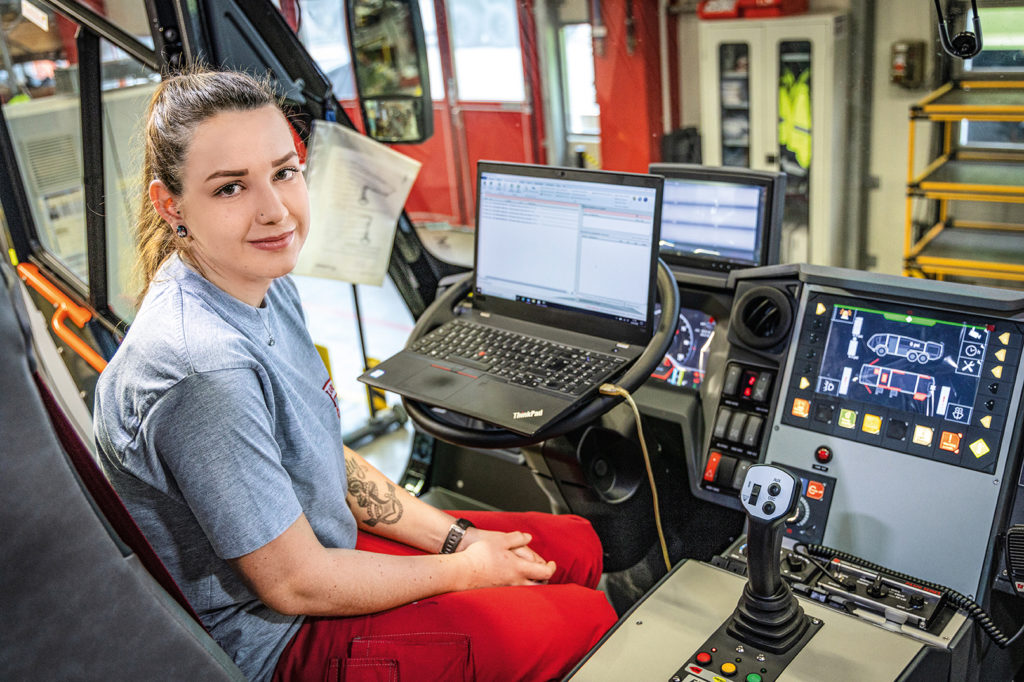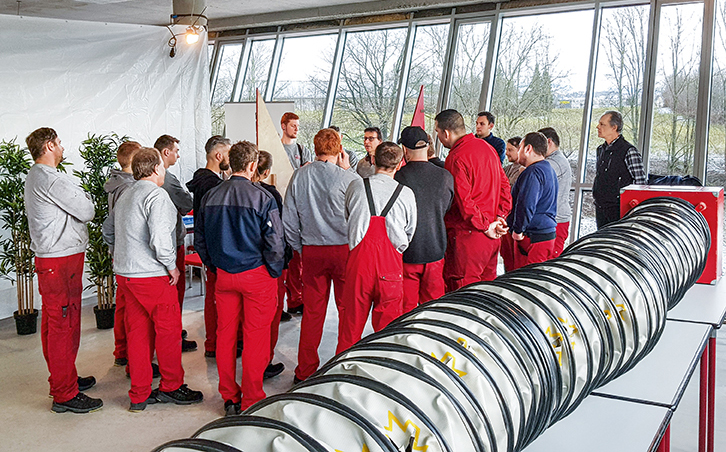Responsible Employer
Rosenbauer has 3,984 employees worldwide, men and women who make a difference with their diversity and ideas. The company provides an environment in which every employee can contribute their talent and efforts. As an employer, Rosenbauer takes the health of employees very seriously and places the highest priority on occupational safety.

Kerstin Karl at her workplace at the production site in Leonding


Current social and technical developments are changing the environment in which Rosenbauer and firefighting technology operate. As a result, employees’ needs and requirements are changing. The COVID-19 pandemic in the 2020 reporting year also had a significant impact on the working world. Digital networks and communications became considerably more important during that time.
Management of the Covid-19 Pandemic
At the start of the COVID-19 pandemic, Rosenbauer set up a global crisis management team at Group headquarters. This coordinating committee, composed of HR Management representatives, executives, and the entire Executive Board was tasked with global pandemic management. Action plans were developed and modified daily to comply with national government directives, translated into various languages, and made available to all Group companies. Effective and regular communication to employees and support from executives was crucial to ensure successful implementation.
Working conditions at the Rosenbauer sites were modified extensively to minimize the risk of infection. In addition to offering office staff the option of working remotely and from home, shifts and work plans in Production were changed to ensure necessary physical distancing. The well-being of employees was always the top priority.
Despite the rampant pandemic, the Group spent a total of €750 thousand on training and continuing professional development in 2020 (2019: €1.0 million). Training was provided in hybrid or virtual formats, which increased the number of international participants while also cutting costs.
Employment Structure
In fiscal year 2020, Rosenbauer had 3,984 employees worldwide – an increase of around 4% over the previous year. Of these, 60.8% are blue-collar workers who mainly work in production, assembly and repair, and 39.2% are white-collar workers who work in administration, development, and sales. In the Group as a whole, only 5.1% of Rosenbauer’s employees work part-time, and more white-collar workers do so (8.4%) than blue-collar workers (2.9%). Rosenbauer supports flexible working hours, and in addition to part-time options, also offers flextime models.
| Employees of Rosenbauer Group by region (headcount) | All employees | Blue-collar workers | White-collar workers | ||||||
|---|---|---|---|---|---|---|---|---|---|
| 2020 | 2019 | 2018 | 2020 | 2019 | 2018 | 2020 | 2019 | 2018 | |
| Austria | 1,621 | 1,558 | 1,442 | 905 | 891 | 823 | 716 | 667 | 619 |
| Germany | 979 | 963 | 906 | 631 | 626 | 585 | 348 | 337 | 321 |
| Rest of Europe | 294 | 302 | 256 | 156 | 164 | 143 | 138 | 138 | 113 |
| USA | 911 | 829 | 841 | 638 | 597 | 600 | 273 | 232 | 241 |
| Rest of World | 179 | 176 | 166 | 94 | 116 | 102 | 85 | 60 | 64 |
EDUCATION AND TRAINING
Rosenbauer invests in its employees by offering customized training and continued professional development programs and helps them realize their full potential and contribute their skills and expertise to the company. As a result of the COVID-19 pandemic, training and professional development was converted to hybrid or virtual formats to protect employee health. This led to cost savings on the one hand and to greater international participation on the other hand.
Training Concepts for Apprentices
Rosenbauer invests in its employees by offering customized training and continued professional development programs and helps them realize their full potential and contribute their skills and expertise to the company. As a result of the COVID-19 pandemic, training and professional development was converted to hybrid or virtual formats to protect employee health. This led to cost savings on the one hand and to greater international participation on the other hand.
Rosenbauer is heavily committed to training young people and offers apprenticeships in over ten different professions. These range from the traditional office and industry-based management assistant to the metal or mechatronics engineer.
Continued Professional Development
Rosenbauer continually invests in both professional and personal development, with the aim of preserving and fostering its employees’ qualifications and motivation. In-house and external experts offer tailored training and continuing professional development programs adapted to the working environment. At the Austrian, German and Swiss locations, courses can be booked on the company portal, which will be rolled out to other locations. Regular professional development reviews help to determine employees’ needs and development goals. In Austria, Germany and Switzerland, employees have the opportunity to take educational leave or participate in work-based part-time education models. In 2020, 31 employees made use of these options.
In the reporting year, each employee had an average of 5.5 hours of traditional continued professional development, with white-collar workers spending approximately 13.2 hours in training and blue-collar workers 5.9 hours.
| Employees of Rosenbauer Group by gender (per 12/31/2020 in % and headcount) | 2020 | 2019 | 2018 |
|---|---|---|---|
| All employees | |||
| Women | 507 | 473 | 432 |
| Women in % | 12.7% | 12.4 % | 11.9 % |
| Men | 3,477 | 3,355 | 3,179 |
| Men in % | 87.3% | 87.6 % | 88.1 % |
EMPLOYEE SATISFACTION
Employee satisfaction encompasses many issues that intersect and interact. Rosenbauer regularly conducts annual employee development reviews and uses these as a basis for determining actions to take to motivate employees for the long term. These measures are intended to address the requirements of Rosenbauer as an employer, while also meeting the needs of blue-collar and white-collar workers.
Long period of employment at Rosenbauer
A long period of service with the company underscores a high degree of employee satisfaction and identification with Rosenbauer. More than 37% of employees at the locations in Austria have worked at Rosenbauer for more than ten years, while nearly 16% have been with the company for at least 20 years.
Evaluation of Psychological stressors at Work
In Austria, we are legally obligated to evaluate sources of stress in the workplace. This effort began in 2014 at Rosenbauer and was completed at all locations in Austria as part of a multi-stage process. The Kurzfragebogen zur Arbeitsanalyse (KFZA, or Questionnaire for Workplace Analysis) was used at very comparable workplaces and received a highly satisfactory response rate of 87%. Information about workplaces not fitting into this category and smaller units was collected in group and individual interviews. In 2020, a monitoring process was launched in which agreed measures were discussed in terms of their effectiveness and possible new measures were defined. In some business units, implementation has already begun.
Dialog and Information Exchange with Employees
Regular performance reviews are part of responsible corporate culture at Rosenbauer and are conducted in the spirit of open and respectful dialog. Based on a discussion guide, these are held regularly between employees and their direct supervisors on a mandatory basis. In the course of these meetings the past year, performance, skills and qualifications are discussed with employees along with professional development opportunities. These discussions with employees were held at all levels at Rosenbauer again in 2020.
Promotion of Work-Life Balance
As a responsible employer, Rosenbauer aspires to offer its employees an optimal work-life balance. This includes improving the compatibility of work and family life. Since 2015, Rosenbauer has operated an in-house daycare center for employees’ children adjacent to the Group’s headquarters in Leonding. For older children of employees, Rosenbauer offers a summer camp during school holidays that is financially supported by the company. Rosenbauer supports flexible working hours and offers both parttime and flextime work, or work-from-home days. Across the Group, 5.1% of employees work part-time, with more of them in white-collar (8.4%) than blue-collar jobs (2.9%).
Occupational safety training on the subject of cut occupational accidents

OCCUPATIONAL SAFETY AND HEALTH PROTECTION
Rosenbauer attaches great importance, both in Production and Administration, to providing employees with a working environment that maintains and ensures their health and well-being. Optimally protecting employees from risks and dangers during their work is a matter of particular importance to us.
Prevention at the Fore
Many occupational safety measures are aimed at prevention, and thus at reducing the number of accidents. Raising awareness among employees about potential hazards, and identifying and eliminating possible sources of hazards are important measures in this regard carried out at all locations worldwide. The issue of occupational safety is regularly discussed in team meetings. In early 2020, an extensive safety campaign targeting 955 employees in Production and Logistics and their managers was held at all production facilities in Austria. The objective was to raise employee awareness for occupational safety. The campaign concentrated on measures to prevent cuts, because this is the most common type of occupational injury.
Occupational Safety – ISO 45001 Certification
Due to its importance, occupational safety at Rosenbauer is firmly embedded in its organization and procedures: locations in Austria (Leonding Plant I and Plant II, Neidling, Graz, Telfs), Germany (Karlsruhe, Luckenwalde), Rosenbauer Brandschutz, and Slovenia (Radgona) are certified to ISO 45001. This means that 67.4% of Rosenbauer’s employees work at locations with certified occupational safety management systems and 39.2% operate at sites with additional internal audits.
Accident Statistics
In 2020, Rosenbauer had a total of 267 occupational accidents, of which 114 resulted in more than three days’ sick leave per employee. The company set itself the goal in 2018 of reducing the accident rate to a maximum of 30 accidents per one million working hours by 2023. At 64.6 accidents per one million working hours, the accident rate in the year under review rose slightly year over year. Accident figures rose sharply year-on-year due to the significantly improved recording of minor accidents at several locations. Accompanied by greater awareness among the employees, this should be seen as a success. A permanent reduction of occupational accidents can only be successful once all occupational accidents are recorded with no gaps. There were no fatal accidents in the reporting year.
Occupational Health
As part of health protection and health promotion, Rosenbauer offers its employees various preventive measures. In Austria, an in-house sports association helps the workforce stay fit and covers the costs of taking part in sports events. Health programs at various locations motivate employees to choose a healthy lifestyle. Customized hearing protection was procured for Production employees which is more comfortable to wear, thereby increasing the frequency with which it is worn. Safety shoes that meet the employees’ individual needs are also made available.
Throughout the Group, the average sick days in the reporting year stood at 9.6, remaining stable year over year.
| Occupational accidents | Total | Accidents per 1 million working hours | ||||
|---|---|---|---|---|---|---|
| 2020 | 2019 | 2018 | 2020 | 2019 | 2018 | |
| Total | 267 | 275 | 221 | 64.6 | 63.2 | 54.6 |
| Austria | 102 | 84 | 104 | 66.4 | 50.7 | 70.0 |
| Germany | 124 | 167* | 60 | 182.1 | 235.4* | 83.2 |
| Rest of Europe | 16 | 8 | 11 | 60.8* | 31.8 | 48.1 |
| USA | 24 | 15 | 42 | 25* | 9.4 | 27.9 |
| Rest of World | 1 | 1 | 4 | 8.8 | 7.4 | 37.2 |
* Sharp increase due to stricter recording
DIVERSITY AND EQUAL OPPORTUNITIES
Rosenbauer believes that a respectful and open corporate culture promotes and advances diversity. It is therefore committed to a work environment that is free from prejudice and discrimination of any kind. Employees are treated with the same respect and tolerance regardless of their gender, age, sexual orientation and identity, nationality, ethnic origin, religion and ideology. In order to make this absolutely clear to the wider world as well, the company signed the “Diversity Charter” in 2017, which provides a platform for dialog and promoting diversity in the company.
Status Goal Proportion of Women
Promotion of Women in Technical Professions
In the recruitment process, care is taken to treat male and female applicants equally. The total percentage of women in the Group is 12.7% and remained stable compared to the previous year.
The share of female executives decreased slightly, from 12.1% in 2019 to 10.8% in 2020. These statistics are based on the most senior level of management at the individual locations. As a manufacturer that takes on apprentices, Rosenbauer’s stated objective is to encourage girls to follow a technical career path. The percentage of young women doing an apprenticeship was 19.8% in 2020. Female apprentices in Production accounted for a share of 7%.
In 2018, Rosenbauer set itself the goal of increasing the total number of women in the company by at least 25% by 2023. By the same year, the proportion of female industrial apprentices is expected to increase to 10%. A greater focus is therefore placed on recruiting female employees.
COMMITMENT TO PRODUCTION LOCATIONS
Rosenbauer takes sponsorships in areas closely relating to its business, such as for firefighting, sports and youth training. For many years, the company has also been supporting children’s and youth facilities. In cases of natural disasters or other emergencies, Rosenbauer donates products to fire services. Rosenbauer above all supports social projects near its production locations. In South Africa, the company has been working for years with an NGO to improve living conditions in a slum area in Cape Town.
Another example of social commitment includes the cooperation with SOS Children’s Village. For years now, Rosenbauer has sponsored two programs at the Altmünster Children’s Village in Upper Austria. We also support the Caritas-operated St. Isidor Children‘s Village near our Group headquarters every year.
Moreover, all locations support local fire services with donations of products and money. In this context, the company concentrates on regions particularly exposed to natural disasters, such as the location in Australia.